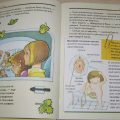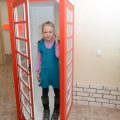 Photo: Getty Images In a greater or lesser extent, everyone lies: both adults and children. For a child, this is a normal reaction to various circumstances. Up to 5 years, kids can not lie. They do not yet distinguish where reality is, and where is fiction, and simply fantasize, invent a lot. By the age of 7, children develop a conscience and morality. They already understand the difference between good and evil, truth and untruth. And then many are beginning to recruit, trying to win a significant place among their peers. At the age of 8 to 10 years, children tend to measure themselves in front of each other, who has richer parents, cooler cars, new-fashioned gadgets. There is nothing terrible in this, they will grow up and stop writing such fables. It is much worse when a lie for a child is a defense or a cry for help. And this is often the fault of the parents.
Photo: Getty Images In a greater or lesser extent, everyone lies: both adults and children. For a child, this is a normal reaction to various circumstances. Up to 5 years, kids can not lie. They do not yet distinguish where reality is, and where is fiction, and simply fantasize, invent a lot. By the age of 7, children develop a conscience and morality. They already understand the difference between good and evil, truth and untruth. And then many are beginning to recruit, trying to win a significant place among their peers. At the age of 8 to 10 years, children tend to measure themselves in front of each other, who has richer parents, cooler cars, new-fashioned gadgets. There is nothing terrible in this, they will grow up and stop writing such fables. It is much worse when a lie for a child is a defense or a cry for help. And this is often the fault of the parents.
The child lies because...
…is afraid of parental anger.If you are too strict with him, he will lie out of fear, trying to avoid condemnation or punishment. ... many demands are made of him. The higher the bar you set for him, the more often he lies, so as not to disappoint his parents with his actions. ... does not trust his parents. If he does not have mutual understanding with loved ones, the child will constantly hide something, deceive, dodge. ... he is often criticized. If the parents are always unhappy, lying will become a defense. The child will keep silent about bad grades, his failures. ... loves his parents very much and does not want to upset them. If you insist that his hooliganism drives you crazy, you are very worried about the plate he broke or the soup he spilled on the floor, the child will remember this and next time will try not to advertise such things. ... he lacks warmth and care. With virtuoso lies and made-up stories, he tries to attract the attention of his parents.
To prevent your child from becoming a pathological liar:
1. Don't lie yourself.
Keep an eye out, maybe you are the one giving it to the childbad example. A dad who buys his son ice cream and says, "Just don't tell Mom about this," teaches him to lie. And sometimes you don't even notice that you're lying in front of your little one. But he notices everything and takes note.
2. By the age of 7, you will teach your child to distinguish between truth, lies, fantasy, and fiction.
Children learn information from books very well,cartoons. Arm yourself with Nosov's story "Dreamers", Dragunsky's "The Secret Always Becomes Clear". And be sure to say everything: "Now we will come up with a fairy tale together!", "Now we are playing: you are a princess, I am your pony".
3. Don't demand 100% openness from your child.
He may have personal secrets.But he must understand that you can't lie about things that concern his life, health, safety. Speak directly: "If you want me to trust you, answer a specific question honestly. And I want to know where you are, with whom, what you are doing, so that I can help you if necessary."
4. Expose him gently.
If a child lies to your face, you, of course,should bring him to clean water. Simply say: "I'm upset that you lied to me." Or: "Sit down and think about why you lied to me." Do not scold your son or daughter. The child should feel that even when he makes a mistake, you are on his side.
5. Don't punish for lying.
This will escalate the situation and the child will distance himself from you.
6. Don't limit his freedom, give him the right to choose.
If your son says honestly, “I don’t want to go to school,” and you let him stay home at least once, he won’t have the desire to lie about a sore stomach or feeling unwell in order to skip classes.
7. Don't panic.
As long as lying doesn't harm anyone, there's no need to worry.It is worth it. But you can't turn a blind eye to it either. While the child is small, instill in him that you won't get far with tricks and lies, there is nothing good in them. When a 12-year-old schoolchild lies for any reason, it is better to seek help from a specialist. The reason may lie in psychological problems and even in a neurological disease.









